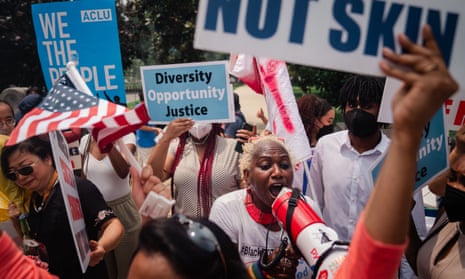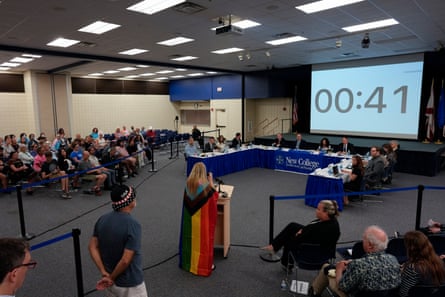Trump promises a crackdown on diversity initiatives. Fearful institutions are dialing them back already
As the president-elect and his allies plan a multi-pronged attack on DEI policies, companies and campuses are complying with threats even though they don’t have to

In 2020, Donald Trump signed an executive order against “race and sex stereotyping and scapegoating” which would have set the stage for sweeping attacks on diversity initiatives in the public sphere. In January 2021, on his first day in office, Joe Biden rescinded Trump’s anti-DEI order and signed onepromoting “racial equity and support for underserved communities”.
Now Trump is returning to office, he expected to restore his directive and double down on it. The people that run diversity, equity and inclusion (DEI) initiatives at public and private institutions are expecting mass crackdown. Project 2025 has labeled them “woke culture warriors” and pledged to wield the full force of the federal government against their efforts to create a more equitable society.
Trump and his advisers have already threatened the funds and accreditation of universities they have labeled the “enemy”, and pledged to dismantle diversity offices across federal agencies, scrap diversity reporting requirements and use civil rights enforcement mechanisms to combat diversity initiatives they see as “discrimination”.
The multi-pronged attack is certain to be met with major legal challenges, but while they prepare for those, advocates warn about the ripple effects of an administration declaring war on inclusivity efforts.
“The concern is the bigger footprint and symbol,” said Nina Ozlu Tunceli, chief counsel of government and public affairs at Americans for the Arts. “Federal policies do have a domino effect on other states, on foundations, on individual donors.”
Last week, Walmart became the latest in a series of high-profile companies to announce a rollback of its diversity initiatives following a campaign of legal challenges by conservative groups. Other businesses and institutions small and large are trying to keep a low profile to avoid becoming the target of anti-DEI campaigns, those who work with them say.
There are already concerns that institutions fearful of losing funding or facing lawsuits may overcorrect and dial back their programmes before they are required to do so, advocates warn.
A climate of fear
Even before Trump was re-elected, “educational gag orders” seeking to limit discussion of race and LGBTQ+ issues in school classrooms had been introduced in at least 46 states. Last spring, conservative legislators linked campus protests against the war in Gaza to DEI initiatives. Virginia Foxx, the chair of the House committee on education and the workforce, told the presidents of several colleges that her committee would be “steadfast in its dedication to attacking the roots of antisemitic hatred, including anti-Israel DEI bureaucracies”.
Questioning by Foxx’s committee ultimately led to several resignations by college presidents.
“That just got everyone terrified, including private university presidents who previously had been pretty brave about these things,” said Jeremy Young, director of the Freedom to Learn programme at the free speech group PEN America. “It was just this sense that, they’re coming, they’re headhunting for leaders, and you just have to do everything they say or they’re going to fire you or they’re going to cut your budget.”

Even where no laws have been passed, a broad fear of repercussions has prompted some campus leaders to cut back on DEI initiatives, noted Young.
“A number of states have engaged basically in jaw-boning, where the lawmakers will go up to a university president and encourage them or threaten them to close their diversity office while dangling a threat of funding cuts or passing a law the following year,” he said. “So we’re seeing universities trying to comply with these restrictions, or with these threats, even though there’s no law compelling them to do so.”
Young cited the University of Missouri, for instance, where campus leaders in July dissolved its division of inclusion, diversity and equity citing nationwide measures against DEI even though no such law was passed in the state.
In Texas, where state law does ban DEI offices but exempts academic course instruction and scholarly research, the University of North Texas system began scrutinising course materials in search for references to DEI, in what Young called an example of overcompliance and a “complete overreaction”.
It’s a domino effect that anti-DEI activists are exploiting, for instance by sowing confusion about the 2023 supreme court ruling, which was fairly narrow but is sometimes cited as evidence that all DEI initiatives in higher education are illegal, said Leah Watson, a senior staff attorney with the American Civil Liberties Union’s Racial Justice Programme, where she focuses on classroom censorship.
“We are very concerned about the broad chilling effect, and we see conservatives misrepresenting the status of the law in order to further the chilling effect,” Watson said. “Overcorrections are happening, and things are being cut that don’t have to be cut.”
Some institutions have attempted to protect their work by downplaying their language around diversity to ensure that members from states with restrictions in place can continue to access them. Others have changed language about eligibility requirements for fellowships initially intended to promote access to people of color so as to avoid legal challenges.
“There are institutions that want to continue their DEI programmes and they don’t want to be sued and they are really in a hard place with how to do that,” said Watson. “People are trying to fly under the radar at this point.”
The new administration
Going forward, the Trump administration is “likely to be the most virulent anti-DEI administration that we’ve seen”, said David Glasgow, the executive director of the Meltzer Center for Diversity, Inclusion, and Belonging, which helps institutions navigate an array of recent legislative restrictions on diversity work.
“People who do this work are nervous and anxious about what might be restricted but their commitment is still there, so it’s really about trying to figure out what they’re going to be able to do,” he added.
So far, four states – Florida, Texas, Iowa and Utah – have banned diversity, equity and inclusion initiatives or offices in universities, a primary target in the battle against DEI. A fifth, Alabama, has severely restricted them.
In Florida, the Republican governor, Ron DeSantis, also erased nearly all already approved state funding for the arts, ostensibly over a festival promoting inclusivity, which he dubbed a “sexual event”.

That may offer a blueprint for attacks on what conservatives see as “woke” culture under the incoming administration, said Tunceli, of Americans for the Arts.
Institutions anticipating a similar backlash at the national level are already planning to emphasise projects the incoming administration may be more supportive to – like those celebrating the 250th anniversary of American independence, in 2026 – and to turn to alternative funding for those they expect will lose out on federal support.
Many now believe that institutions will have to show bravery to uphold their values, even if it means risking funding. “What they need to do is find a backbone, and I say that with a lot of understanding and empathy for the situation they’re in,” said Young, of PEN America.
“I worry when I see a university roll over for funding,” he added, calling on administrators to leverage their influence with alumni and their communities to stand up to legislators’ attacks. “A university that doesn’t have a new building is still a university, it’s just a poor university. A university that has lawmakers banning ideas and restricting the actions of the administration is really not a university at all.”
No comments:
Post a Comment